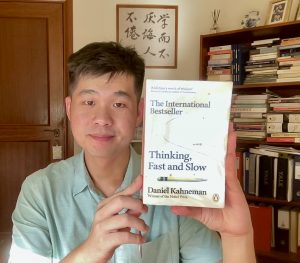Young Children’s Voices in Mathematical Problem Solving
Contributed by Dr Ho Siew Yin and Sng Wei Qin Abbie, from NTUC First Campus, for SingTeach Virtual […]
Read More
Contributed by Seow Yongzhi , from Broadrick Secondary School, for SingTeach Virtual Staff Lounge
Dan Kahneman’s brilliant book, Thinking, Fast and Slow (2011), is a powerful primer for all of cognitive psychology. Economist Steven Levitt christened it “a lifetime’s worth of wisdom”. In the book, Kahneman describes a model of human cognition in which humans operate by two thinking systems: System 1, which is fast thinking that operates based on biases and heuristics; and System 2, which is slow thinking that operates based on deliberation, logic, and use of evidence. We make many decisions under time pressure using System 1, and unseen cognitive biases may lead to errors in judgement.
I read the book for personal growth amidst the pandemic, but nevertheless found many gems of insight that could be extended into my professional pedagogical practices. In this article, I summarize five key findings on cognitive psychology from Kahneman’s book, and identify applications in our professional processes.

A key statistical principle is that people tend to perform close to (their) average. If someone does exceptionally well on a test, they are likely to do “worse” for the next test; and if someone has done very poorly, the “only way to go is up”. Flight instructors felt that punishment was an effective pedagogical tool, because poorly performing cadets improved after being punished. However, Kahneman demonstrated that “poor performance was typically followed by improvement and good performance by deterioration, without any help from either praise or punishment.” In other words, the flight cadets would likely have “improved” in their next performance regardless of the intervention; however, praise would have had better effects on the cadet’s morale than punishment.
Expertise is a set of interlinked skills. There are two requirements for building skills: “an environment that is sufficiently regular to be predictable [and] an opportunity to learn these regularities through prolonged practice”. However, some domains (such as gambling) do not allow for the development of skills, because the environment is not regular. Our teaching subjects and many CCAs in our schools do meet such requirements, and are ideal pastures for the building and development of expertise.
“Insiders” tend to have an irrationally optimistic view of their team’s effectiveness and progress, and may ignore data or findings to the contrary. The example used by Kahneman, intriguingly enough, involves a project to write a psychology textbook for Israel’s Ministry of Education. Kahneman’s takeaway was that his team was plagued by “irrational perseverance: … we gave up rationality rather than give up the enterprise.” In other words, people “inside” a project, with a stake in their success, failed to be objective in their evaluation of their team’s effectiveness.
The way that we ask (or “frame”) a question will lead to different answers. For example, countries ask drivers if they are willing to donate their organs in the event they are involved in a fatal traffic accident. This is an important decision that could save many other lives. The difference in drivers’ willingness to donate lies in the way the question is asked: where drivers need to “opt out” of donation, there is an extremely high donation rate; but where drivers need to “opt in” to offer donation, there is a very low donation rate. In general, people are biased towards cognitive ease: people prefer to go with a default option, rather than make the effort to “opt in” or “opt out” of anything.
People remember life events and episodes in terms of their best (and worst) moments, as well as how the event or episode ended. In fact, when evaluating one’s entire life, Kahneman found that “peaks and ends matter but duration does not”. This intuitive judgement plays an important role in deciding whether to repeat the event or episode.
Reference
Kahneman, Daniel. Thinking, Fast and Slow. New York: Farrar, Straus and Giroux, 2011.